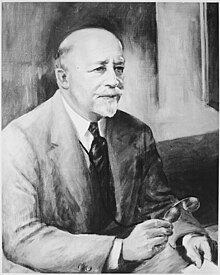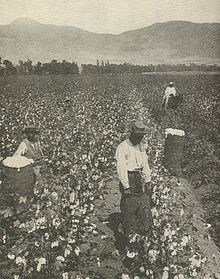Forty acres and a mule
Forty acres and a mule is part of Special Field Orders No. 15, a post-Civil War promise proclaimed by Union General William Tecumseh Sherman on January 16, 1865, during the American Civil War, to allot land to some freed families, in plots of land no larger than 40 acres. Sherman later ordered the army to lend mules for the agrarian reform effort. Freed people widely expected to legally claim 40 acres of land. However, Abraham Lincoln's successor as president, Andrew Johnson, tried to reverse the intent of the field order. Some land redistribution occurred. However, federal and state policy during the Reconstruction era emphasized wage labor, not land ownership, for black people. Almost all land allocated during the war was restored to its pre-war white owners.


Quotes
edit- I chose the number of the bill, 40, as a symbol of the forty acres and a mule that the United States initially promised freed slaves. This unfulfilled promise and the serious devastation that slavery had on African-American lives has never been officially recognized by the United States Government.
- John Conyers, in Reparations, Conyers.house.gov
- So far as the Negroes were concerned, their demand for a reasonable part of the land on which they had worked for a quarter of a millennium was absolutely justified, and to give them anything less than this was an economic farce.
- W. E. B. Du Bois, Black Reconstruction in America, 1860-1880 (1935), p. 602
- To have given each one of the million Negro free families a forty-acre freehold would have made a basis of real democracy in the United States that might easily have transformed the modern world.
- W. E. B. Du Bois, Black Reconstruction in America, 1860-1880 (1935), p. 602
- The Sherman order gave rise to all sorts of difficulties. The Negroes were given only possessory titles. Then the owners came back and immediately there was trouble. The Negroes protested, “What is the use of giving us freedom if we can’t stay where we were raised and own our own house where we were born and our own piece of ground?” It was on May 25, 1865, that Johnson in his Proclamation of Pardon had provided easy means whereby all property could be restored, except the land at Port Royal, which had been sold for taxes. General Howard came to Charleston to make arrangements, and the story is characteristic—“At first,” said a witness, “the people hesitated, but soon as the meaning struck them that they must give up their little homes and gardens and work for others, there was a general murmuring of dissatisfaction.”
- W. E. B. Du Bois, Black Reconstruction in America, 1860-1880 (1935), p. 602
- President Johnson, forgetting his own pre-war declaration that the “great plantations must be seized, and divided into small farms,” declared that this land must be restored to its original owners and this would be done if owners received a presidential pardon. The pardoning power was pushed and the land all over the South rapidly restored. Negroes were dispossessed.
- W. E. B. Du Bois, Black Reconstruction in America, 1860-1880 (1935), p. 603
- The Negro voter ... had, then, but one clear economic ideal and that was his demand for land, his demand that the great plantations be subdivided and given to him as his right. This was a perfectly fair and natural demand and ought to have been an integral part of Emancipation. To emancipate four million laborers whose labor had been owned, and separate them from the land upon which they had worked for nearly two and a half centuries, was an operation such as no modern country had for a moment attempted or contemplated. The German and English and French serf, the Italian and Russian serf, were, on emancipation, given definite rights in the land. Only the American Negro slave was emancipated without such rights and in the end this spelled for him the continuation of slavery.
- W. E. B. Du Bois, Black Reconstruction in America, 1860-1880 (1935), p. 611
- Treason must be made odious, and the traitors must be punished and impoverished, their great plantations must be seized, and divided into small farms, and sold to honest, industrious men. The day for protecting the lands and negroes of these authors of rebellion is past.
- Andrew Johnson, "Treason must be made odious," speech at Nashville, Tennessee, June 9, 1864, as repoerted by E. McPherson, Political History of Reconstruction, p. 46
- In October of 1865, the freedpeople of Edisto Island, South Carolina, learned that the land they had farmed during the war and now regarded as their own was about to be restored to its rebel owners. They sent a letter of protest to General O. O. Howard, commissioner of the Freedmen’s Bureau. “Land monopoly is injurious to the advancement of the course of freedom,” wrote a committee of three, “and if Government Does not make some provision by which we as Freedmen can obtain A Homestead, we have Not bettered our condition.” This judgment reflected the sentiment of former slaves...
- Edward Royce, “Forty Acres and a Mule.” The Origins of Southern Sharecropping, Temple University Press, 1993, pp. 86–118. JSTOR